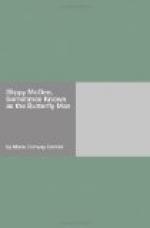When at times the secretary brought his guests to see what he pleasingly enough termed Appleboro’s one claim to distinction, the Butterfly Man did the honors to the manner born. Drawer after drawer and box after box would he open, patiently answering and explaining. And indeed, I think the contents were worth coming far to see. Some of them had come to us from the ends of the earth; from China and Japan and India and Africa and Australia, from the Antilles and Mexico and South America and the isles of the Pacific; from many and many a lonely missionary station had they been sent us. Even as our collection grew, the library covering it grew with it. But this was merely the most showy and pleasing part of the work. That which had the greatest scientific worth and interest, that upon which John Flint’s value and reputation were steadily mounting, was in less lovely and more destructive forms of insect life. Beside this last, a labor calling for the most unremitting, painstaking, persevering research, observation, and intelligence, the painted beauties of his butterflies were but as precious play. For in this last he was wringing from Nature’s reluctant fingers some of her dearest and most deeply hidden secrets. He was like Jacob, wrestling all night long with an unknown angel, saying sturdily:
“I will not let thee go except thou tell me thy name!” Like Jacob, he paid the price of going halt for his knowledge.
I like to think that Hunter understood the enormous value of the naturalist’s work. But I fancy the silent and absorbed student himself was to his mind the most interesting specimen, the most valuable study. It amused him to try to draw his reticent host into familiar and intimate conversation. Flint was even as his name.
Oddly enough, Hunter shared the Butterfly Man’s liking for that unspeakable Book of Obituaries, and I have seen him take a batch of them from his pocket as a free-will offering. I have seen him, who had all French, Russian and English literature at his fingers’ ends, sit chuckling and absorbed for an hour over that fearful collection of lugubrious verse and worse grammar; pausing every now and then to cast a speculative and curious glance at his impassive host, who, paying absolutely no attention to him, bent his whole mind, instead, upon some tiny form in a balsam slide mount under his microscope.
“Why don’t you admire Mr. Hunter?” I was curious to know.
“But I do admire him.” Flint was sincere.
“Then if you admire him, why don’t you like him?”
He reflected.
“I don’t like the expression of his teeth,” he admitted. “They’re too pointed. He looks like he’d bite. I don’t think he’d care much who he bit, either; it would all depend on who got in his way.”
Seeing me look at him wonderingly, he paused in his work, stretched his legs under the table, and grinned up at me.




